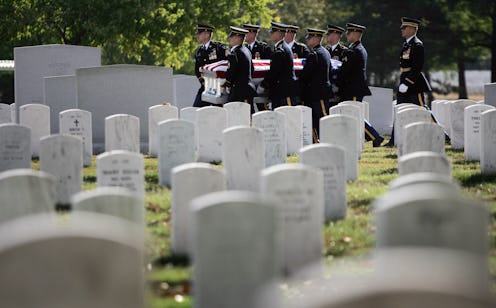News
Why Notifying A Fallen Soldier's Family Is Both A Strict & Heartbreaking Process

When a member of the military dies in combat, strict procedures are in place dictating how that information is relayed to the service member's family. White House Chief of Staff and former Commander of the United States Southern Command Gen. John Kelly explained the process of informing a fallen soldier's family in detail during a White House press briefing on Wednesday, Oct. 19.
Kelly's explanation was prompted by a recent controversial phone call that President Trump made to Myeshia Johnson, the widow of Sgt. La David T. Johnson, who died in combat in Niger in October. Florida Congresswoman Frederica S. Wilson said she was in the car with Sgt. Johnson's family at the time, and claimed that Trump made insensitive comments to Myeshia about her husband's death. She claimed that Trump said Lt. Johnson "knew what he was getting into" when he enlisted. The president denied Wilson's account on Twitter, describing it as "totally fabricated," but Kelly more or less confirmed its sentiments in the briefing on Wednesday.
Gen. Kelly took to the press briefing on Wednesday to defend Trump's intentions. Largely, he did so by breaking down the processes in place regarding notification of family members. He also explained which people and groups typically reach out to families to express condolences. Kelly was speaking not only from decades of military service, but also from experience: His son, Lt. Robert Kelly, died in Afghanistan in 2010.
Kelly explained that immediately after death, the body of a fallen service member is wrapped by his cohorts by "whatever passes as a shroud," and is then sent off, packed in ice twice, and taken to the Dover Air Force Base in Delaware.
At Dover, Kelly said, the body is embalmed and dressed in uniform, including whatever medals he or she has earned. Afterward, the body is escorted home with a casualty officer.
Simultaneously, Kelly said, "a casualty officer typically goes to the home very early in the morning and waits for the first lights to come on." There are usually two officers, and when they see a light on, Kelly said, they knock on the door. If the deceased is married, then this process happens in two different places — at the home of the spouse and at the home of the parents. Kelly said that if the parents are divorced, then the news would be delivered in as many as three places.
The notification team will stay to make sure that the situation is as emotionally stable as could be possible, given the circumstances, before they leave. According to SpouseBuzz, a news blog devoted to military spouses, a military unit will enter a communication blackout until the families have been notified of the death.
Reportedly, the goal of this complex system is to ensure that the families of the deceased are notified of the death first, and notified accurately. If two service members show up at your door, in other words, the idea is that the death is as verifiable as possible. This eliminates space for a potential hoax or horrible miscommunication.
According to Amy Bushatz at SpouseBuzz, this also ensures that the grieving family members will be in a safe space when they hear the news. They wouldn't be, say, driving a car. They also wouldn't be alone in the case of a dramatic physical reaction, such as fainting. Immediate kin are reportedly supposed to be notified of the death within 12 hours.
After his explanation on Wednesday, Kelly said that U.S. presidents do not typically call the families of fallen service members. "Typically, the only phone calls a family receives are the most important phone calls they could imagine, and that is from their buddies," Kelly said. He shared that when his son died, his son's friends called Kelly's family from Afghanistan, "telling us what a great guy he was. Those are the only phone calls that really mattered."
Kelly said that when he became chief of staff, he advised Trump not to make condolence phone calls. He said that President Obama did not call him when his son died in Afghanistan, but that pointing that out is "not a negative thing."
"It's not the phone call that parents, family members are looking forward to," Kelly said.
However, when Trump elected to call the families of those killed in Niger, Kelly said he advised the President on what to say. He told Trump to say what was said to him by his casualty officer when his son died: "that he was doing exactly what he wanted to do when he was killed. He knew what he was getting into... He knew what the possibilities were because we're at war."
This sentiment was precisely the language that Rep. Wilson eviscerated.
"I stand firmly by my original account of his conversation with Myeshia Johnson, the widow of Sgt. La David Johnson," the congresswoman said in a press release.
Lt. Johnson's mother, Cowanda Jones-Johnson, also defended claims that President Trump's phone call contained offensive sentiments. She told The Washington Post in a piece published on Oct. 18 that “President Trump did disrespect my son and my daughter and also me and my husband.” She did not elaborate. Again, Trump denies the account.
In the press briefing, Kelly lashed out at Rep. Wilson. He said he was so "stunned" by what he heard her saying that he left his office for an hour and a half to walk around the Arlington National Cemetery.